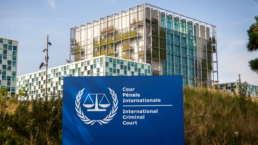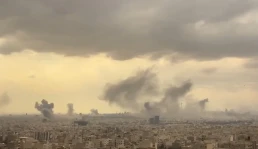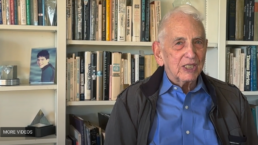Experts on international law pointed to the indiscriminate nature of the blasts in Lebanon and the prohibition on booby traps.
By Jonah Valdez, The Intercept
A day after pagers simultaneously exploded across Lebanon and Syria, a second round of bombs — this time embedded in walkie-talkies and solar equipment — detonated on Wednesday in Beirut and throughout Lebanon.
The combined death toll from the attacks rose to at least 37 people, including a 9-year-old girl and an 11-year-old boy, with more than 3,000 wounded. Doctors at a Beirut hospital reported that many among the injured had lost eyes and had to have limbs amputated. Exploding walkie-talkies caused more than 70 fires to erupt in homes and stores across Lebanon, along with more than a dozen cars and motorcycles.

While the Israeli government has yet to claim responsibility for the attack, multiple U.S. officials have said Israel was behind the device explosions.
The seemingly indiscriminate nature of the attacks has drawn the attention and concern of experts in international law who caution that the explosions may rise to the level of war crimes.
“If it is Israel behind this, they’ve got some tough questions to answer, including to the U.S. government, because the U.S. government is providing great military support,” said Brian Finucane, a former State Department legal adviser under Presidents Barack Obama and Donald Trump. “It really should be in the U.S. government’s interest to ensure that its military partners are complying with the laws of war.”
Recent Posts
As Security Council Stalls, There Are Other Ways to Stop U.S.-Israeli War on Iran
March 3, 2026
Take Action Now A “Uniting for Peace” resolution in the UN General Assembly can counter the Security Council’s failure to act.By Marjorie Cohn,…
States Can Block the Paramount-Warner Deal
March 3, 2026
Take Action Now But thanks to some clever maneuvering, they are already running out of time.By David Dayen, The American Prospect What started as…
Congress, Do Your Job and End This Illegal War of Aggression By The U.S. and Israel
March 2, 2026
Take Action Now Congress must assert its Constitutional authority over matters of war and peace against an out-of-control, rogue president and…
Daniel Ellsberg Speaks to Us as the War on Iran Continues
March 2, 2026
Take Action Now Ellsberg’s voice is back via a compelling new book. “Truth and Consequence,” being published this week, provides readers with his…




